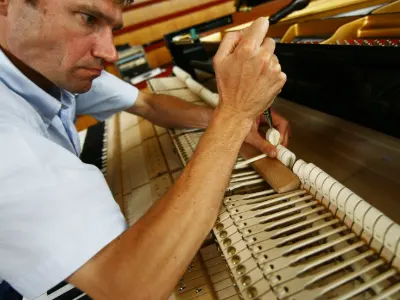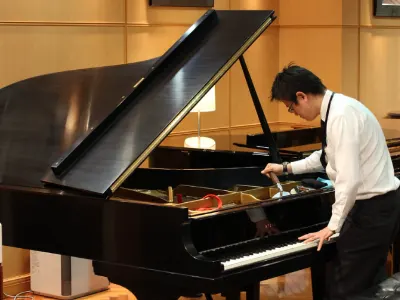Last Updated: July 2nd, 2022 by

Career Shortcuts
Do you love music? Do you have an ear for detail? If so, a career in piano tuning may be the perfect choice for you!
Piano tuning is a skilled trade that requires both patience and attention to detail, and it can be a challenging and rewarding career path.
In this blog post, we will discuss how to become a piano tuner, including the benefits of this career choice and some of the challenges that come with it.
So, if you are interested in learning more about this unique profession, keep reading!
Visit our Career Guide for a list of all our job insights for an in depth look at the new career path you are considering.

Career Guide
How to Become a Piano Tuner

Learning how to become a piano tuner is no easy feat. It requires years of practice and a keen ear for music.
But, if you’re passionate about pianos and have the dedication to learn, it can be a rewarding career. Here’s what you need to know about how to become a piano tuner.
Most piano tuners start out as apprentices, working under the guidance of an experienced tuner.
This is a great way to learn the trade and get hands-on experience with different types of pianos.
You’ll also need to take classes on subjects like piano history, physics, and acoustics.
Once you’ve completed your apprenticeship and schooling, you’ll need to pass a certification exam in order to officially become a piano tuner.
The best way to learn how to tune a piano is to practice regularly. Start by tuning one note at a time, then work your way up to tuning whole scales.
As you gain experience, you’ll be able to tune pianos more quickly and accurately.
You should also strive to develop a good ear for music so that you can identify when a note is off-key.
With practice, patience, and perseverance, you can become a skilled piano tuner.
What it Takes to Become a Piano Tuner

Becoming a piano tuner requires a combination of musical training and mechanical aptitude.
Piano tuners start by completing a music degree, which provides them with the necessary knowledge of music theory and history.
They also need to develop a good ear for pitch, as they will need to be able to identify small variations in sound.
In addition to their musical training, piano tuners must also have experience working with tools and mechanical equipment.
This is because they need to be able to open up the piano and make adjustments to the strings and other parts of the instrument.
As a result, piano tuning is a skilled trade that requires both musical talent and mechanical ability.
Explore the Benefits of This Career Choice
Piano tuners are in high demand.
Not only do they serve an important role in the music industry, but they also offer a unique service that can be extremely rewarding.
For many people, the prospect of becoming a piano tuner is an appealing one.
Here are just a few of the benefits of becoming a piano tuner:
- As a piano tuner, you will have the opportunity to work with some of the most revered instruments in the world. Whether you’re working with grand pianos or upright pianos, your work will be essential in ensuring that these instruments sound their best.
- In addition to working with some of the most iconic instruments, you will also have the opportunity to meet some interesting people. Many professional pianists rely on tuners to keep their instruments in top condition, and you may even have the opportunity to meet some famous musicians!
- Learning how to become a piano turner may also become a lucrative part-time or full-time career. Michael Stilwell, an instructor at the Piano Technician Academy, quoted the monthly income of a beginner piano technician at $1,245 and an established piano technician at anywhere from $6,360 – $10,960 a month!
Some of the Challenges That Come With Piano Tuning

Piano tuning is both an art and a science. Tuners need to have a keen ear for detecting pitch, as well as a strong understanding of piano construction and acoustics.
Tuning a piano is also a delicate process, and even a slight miscalculation can cause the piano to sound out of tune.
As a result, piano tuners must be extremely careful and methodical in their work.
In addition to having a strong technical knowledge, piano tuners must also be good at communicating with customers.
Many customers are not familiar with the inner workings of pianos, and they may not understand why their piano needs to be tuned.
As such, it is the responsibility of the piano tuner to explain the process in terms that the customer can understand.
Piano tuners must also be able to deal with challenging customers who may be unhappy with the results of the tuning.
Overall, being a piano tuner requires a high level of skill and customer serviceability.
Those who are successful in this field are typically those who are passionate about music and have a strong dedication to their craft.
Read More: How to Become an Audio Engineer. Record, mix, and produce sounds for entertainment as an Audio Engineer! Learn what it takes to get started.
Why is This a Unique Profession?
There are few professions more unique than piano tuning.
For one, it requires a keen ear and a detailed knowledge of music theory. But, it also demands a deep understanding of the inner workings of pianos.
A piano tuner must be able to identify each note by sound and then make the necessary adjustments to the string tension.
That’s no small feat, considering that most pianos have more than 200 strings.
The process is both an art and a science, and it takes years of practice to perfect.
As a result, piano tuners are highly sought-after professionals who command a healthy salary.
But their work is also incredibly rewarding. After all, there’s nothing quite like the sound of a finely tuned piano.
Piano technician Ara Vartoukian explains the art and science of piano tuning in this video:
How Can You Learn More About This Profession?
There are a few ways that you can learn more about this profession. The first is to research it online.
Look for articles, videos, and interviews with people who work in this field. You can also look for job postings that list the required qualifications and skills.
Another way to learn more about this profession is to shadow someone who already works in this field.
This will give you a better understanding of what the day-to-day work is like as a piano tuner. You can also volunteer or intern in this field to gain experience.
Finally, you can enroll in a training program or course that will teach you the specific skills and knowledge needed to succeed in this profession.
By taking the time to learn more about this profession, you’ll be better prepared to decide if it’s the right fit for you.
Conclusion
Piano tuning is a unique profession that offers many rewards.
If you’re interested in becoming a piano tuner, be sure to research the field thoroughly and consider enrolling in a training program.
With dedication and hard work, you can become a skilled piano tuner who is in high demand!
Read More
